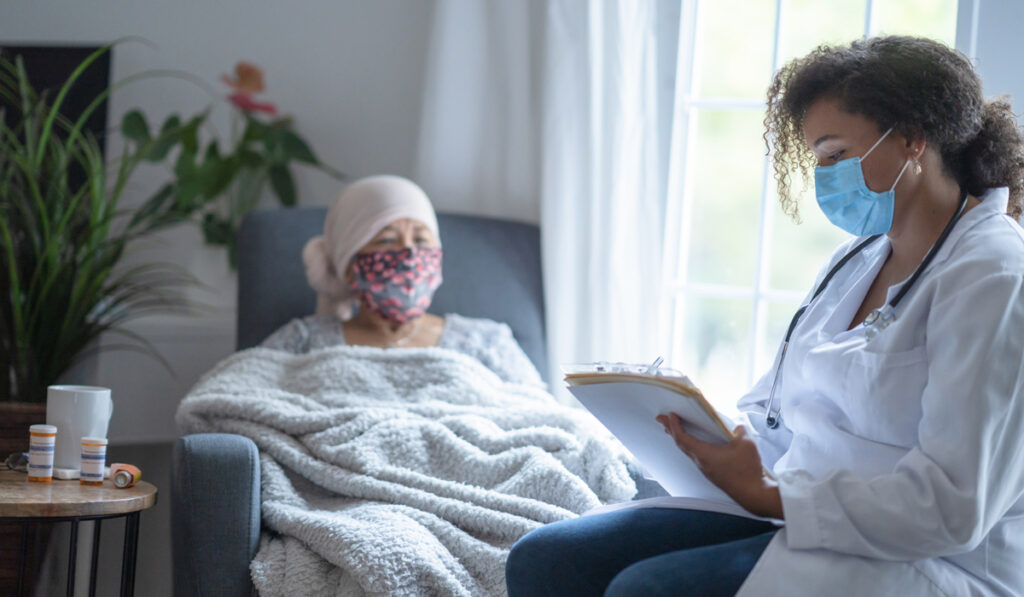The first study to evaluate the clinical characteristics and outcomes of fully vaccinated patients with cancer who developed breakthrough COVID-19 indicates these patients remain at high risk for hospitalization and death.
Published in Annals of Oncology, the study showed that fully vaccinated patients who experienced breakthrough infections had a hospitalization rate of 65 percent, an ICU or mechanical ventilation rate of 19 percent, and a 13 percent death rate within 30 days.
The study was conducted by the COVID-19 and Cancer Consortium (CCC19), a group of 129 research centers tracking the impact of COVID-19 on patients with cancer since the beginning of the pandemic.
“These data highlight the unique vulnerability of patients with cancer and underscore the importance of continued public health measures to control the spread of SARS-CoV-2,” said Jeremy Warner, M.D., director of the CCC19 Research Coordinating Center, an associate professor of medicine at Vanderbilt-Ingram Cancer Center and a senior author of the study.
Cancer and Immune Response
Data for the study were collected between November 1, 2020 and May 31, 2021, before booster vaccines were recommended by the CDC for patients with cancer.
Patients were considered fully vaccinated after having received either two doses of the Pfizer-BioNTech or Moderna vaccine, or one dose of the Janssen (Johnson & Johnson) vaccine, with the last vaccine dose given with enough time to take effect before breakthrough SARS-CoV-2 infection occurred (at least 28 days prior, depending on the vaccine).
“Because measures of immunity are not routinely collected in clinical care, we don’t know whether these were patients who mounted effective immune responses after vaccination,” Warner said. “A lot of emerging data have suggested that patients with cancer, especially blood cancers, don’t mount adequate protective antibody responses.
“It’s important to note that many of the same factors that we identified prior to the availability of vaccination – age, comorbidities, performance status and progressing cancer – still seem to drive many of the bad outcomes.”
At-risk Groups
The consortium identified 1,787 patients who had had both cancer and COVID-19 for the study, the vast majority of whom were unvaccinated. The number of fully vaccinated subjects was 54, and 46 percent of those fully vaccinated exhibited lymphopenia, a condition of having reduced levels of lymphocytes – the T-cells and B-cells responsible for immunological responses to viruses.
Lymphopenia is strongly associated with severe COVID-19 and also commonly occurs in patients receiving anti-CD20 monoclonal antibodies or CAR T-cell therapy for cancer.
“A lot of emerging data have suggested that patients with cancer, especially blood cancers, don’t mount adequate protective antibody responses.”
The study supports previous observations from Warner and colleagues that patients with hematologic malignancies are at greater risk for severe outcomes from COVID-19. In addition, patients on a cancer treatment regimen that included systemic corticosteroids appeared to be more susceptible to hospitalization.
Even after adjustment, the baseline characteristics of fully vaccinated compared to the unvaccinated cohort may partially explain differences in clinical outcomes, including a higher prevalence of progressive cancer – 19 percent in vaccinated versus 14 percent in unvaccinated subjects – and of history of recent systemic anticancer therapy (56 versus 43 percent). However, the number of patients in the study was too small to make definitive conclusions about specific types of anticancer therapies that could be associated with breakthrough infections, the researchers noted.
Ongoing Research
Considering that the analysis took place before spring 2021, when COVID-19 vaccines were first widely available and boosters came on the scene, the population of vaccinated individuals is likely substantially changed. Ongoing studies are addressing this gap and further evaluating the impact of COVID-19 vaccination on patients with cancer.
“We are starting to see a small but increasing number of fully boosted patients with cancer and breakthrough infection being reported to the CCC19 registry now, and plan to analyze their outcomes very soon,” Warner said.
“Many of them were likely infected by the omicron variant and will hopefully have a milder overall clinical course.”





